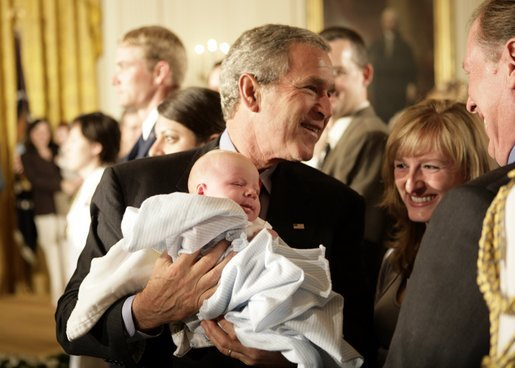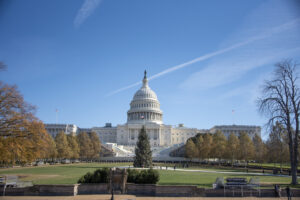
WASHINGTON (BP)–Richard Land has high regard for former President Ronald Reagan, but he believes President George W. Bush will go down as the top pro-life president in recent history.
Even though Bush is leaving office with a job approval rating hovering around 30 percent, Land and other pro-family leaders view Bush fondly, particularly with a pro-choice administration taking over.
“[Bush] got more done than Reagan did,” Land told Baptist Press, referencing pro-life policy. “Reagan was unabashedly pro-life, made some beautiful speeches, supported the [Republican National Convention’s pro-life] platform plank change in 1980 and got elected as a pro-life president. And Reagan faced more opposition in the Congress than Bush has. But in terms of getting stuff done, President Bush was far more consistent in his judicial nominations, far more consistent in his public policy appointees. This has been the most pro-life administration since Roe v. Wade.”
Bush’s pro-life legacy began on day one but truly gained momentum one month before the terrorist attacks of 2001, when on Aug. 9 of that year he delivered a much-anticipated address to the nation in which he prohibited federal money being used on nearly all embryonic stem cell research. Such research involves the destruction of human embryos, in contrast with other methods of research that use adult stem cells from sources like umbilical cord blood and bone marrow.
Bush’s legacy continued in 2003, when he signed a ban on partial-birth abortion, and in 2005, when he nominated John Roberts and Samuel Alito — two justices highly respected by social conservatives — to the Supreme Court. Those two justices voted in 2007 with a 5-4 majority to uphold the partial-birth abortion ban, making it the first time since Roe that the high court upheld a ban on a specific procedure.
“I thought the president did more to humanize the fetus during the discussions on embryonic stem cell research than any American politician has since Roe v. Wade was decided,” Land said, pointing specifically to the August 2001 Bush speech. “Opinion changed overnight, from about a third being for his ban to a majority, almost two-thirds, being for the ban. In that one speech, he did more to humanize the fetus to the general public than I think any American politician ever has. And he continued to do that with eloquent speeches that confronted the American public with the humanity of unborn embryos.”
Bush twice vetoed bills that would have overturned his stem cell policy. In 2006, he signed his first veto in front of a White House audience that included 18 families that had adopted “snowflake” babies — that is, babies who were born after being adopted as frozen embryos, the same types of embryos many scientists want to use for research. Bush went around the room and held some of the babies, helping put a face on the issue. “These boys and girls are not spare parts,” he said during his speech that day. “They remind us of what is lost when embryos are destroyed in the name of research. They remind us that we all begin our lives as a small collection of cells.”
Bush signed the ban on partial-birth abortion after a 2000 general election campaign that saw him repeatedly contrast his position with that of President Clinton, who had twice vetoed similar bans. In fact, Bush even made the issue part of his acceptance speech at the 2000 Republican National Convention, promising that “when Congress sends me a bill against partial-birth abortion, I will sign it into law.”
The debate over partial-birth abortion, Land says, has been a turning point in the pro-life movement. Polls agree. In September 1995 — before Congress and Clinton began debating a partial-birth abortion bill — 56 percent of Americans called themselves pro-choice, 33 percent pro-life, according to a Gallup Poll at the time. In August 1997 — after Clinton’s veto — 47 percent called themselves pro-choice, 44 percent pro-life. Since then, the percentage of Americans who call themselves pro-life has not dipped below 40 percent in the Gallup Poll.
“I think the debate over banning partial-birth abortion is the Uncle Tom’s Cabin of the pro-life movement,” Land said. “Uncle Tom’s Cabin humanized the plight of the slave. The debate over partial-birth abortion humanized the abortion issue for a significant segment of the American population. It confronted the American public with the humanity of the fetus in the same way that Uncle Tom’s Cabin confronted the general public with the humanity of those in human bondage.”
Alito and Roberts, Land says, are the “crown jewels” of Bush’s “pro-family, pro-life legacy.”
“There’s no promise he kept more faithfully than his promise to nominate only strict constructionist, original intent jurists to the court, which means pro-life judges,” Land said. “… [Alito and Roberts] are young, they are articulate, they are brilliant, and they are going to be stars of this court for 20 years.”
During Bush’s final days in office, the Department of Health and Human Services announced a new regulation affirming the right of doctors and other health care providers to refuse to participate in abortions and other medical procedures to which they object — a regulation that seven states, along with pro-choice groups, has since filed suit to overturn.
Bush also issued a proclamation naming Jan. 18 as National Sanctity of Human Life Day. He issued a similar proclamation every year in office.
Among other pro-life achievements during his two terms, Bush signed a bill giving legal protection to infants who survive botched abortions and signed a bill that recognizes an unborn child as a victim when he or she is harmed or killed in a crime against a pregnant woman.
Bush’s pro-life legacy is so high in part because his pro-life beliefs are sincere, Land says.
“It’s been my privilege to have known a significant number of public figures,” Land said. “And I know of no public figure that I know personally where there’s less difference between the public person and the private person than George W. Bush. He is who he is. Whether people like him or not, there’s an authenticity and an integrity to George W. Bush that’s rare in public figures period, much less politicians. He is a conviction politician on steroids.
“This is why I think he faces the future with such equanimity. He has done what he believed was the right thing for the country regardless of the consequences the whole eight years he’s been in office.”
Although Bush’s pro-life legacy is viewed with admiration by pro-life leaders, his overall legacy — at least from the perspective of mainstream historians — doesn’t receive such high marks. Land, though, believes that will change with time.
“I think he will be the Harry Truman of the 21st century. When Harry Truman left office, he had a 24 percent approval rating,” Land said. “And now, he is widely considered to be the third most consequential president of the 20th century, behind Roosevelt and Reagan. I think George W. Bush will have a similar rehabilitation in history. Truman lived in a very controversial time and was unpopular for doing a lot of controversial things — controversial things that in retrospect have been seen to be very wise: the early understanding of the communist threat, NATO, the Berlin airlift, the Marshall Plan, putting into the place the worldwide policy of containment, the decision to intervene in Korea. I think this president has done the same thing. I think he’s put the same kind of structure and strategy in place to help us win the worldwide war against radical Islamic jihadism.”
Bush’s overall legacy will improve as the situation in Iraq improves, Land added.
“I tell people, ‘Let’s assume that in 25 years Iraq is the South Korea of the Middle East,” Land said. “If that happens, they’ll be building statues to George Bush the liberator in downtown Baghdad. There was no more reason in 1953 to believe that South Korea was going to become South Korea [as we now know it] than there is to believe that Iraq would become South Korea. That will transform that entire region.”
–30–
Michael Foust is an assistant editor of Baptist Press.














